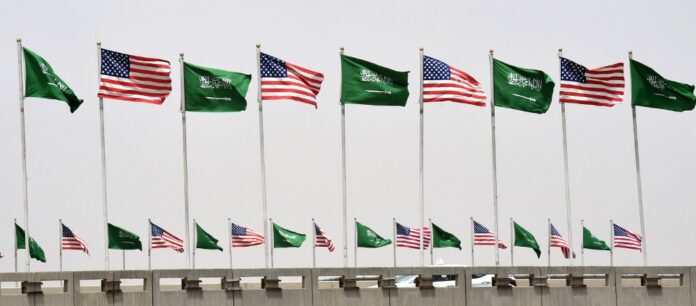The United States and Saudi Arabia are preparing to sign a Memorandum of Understanding (MOU) to enhance cooperation in civilian nuclear technology and broader energy development.
US Energy Secretary Chris Wright announced the move during a press conference held in Riyadh on Sunday.
While specific details regarding nuclear cooperation will be released later this year, Wright confirmed that the agreement is a step toward building a commercial nuclear power industry in the Kingdom. “With meaningful developments expected this year,” he said, referring to Saudi Arabia’s long-standing goal of diversifying its energy sector.
Ben Dietderich, press secretary and spokesperson for the US Department of Energy, clarified the nature of the MOU in a statement following the event. “The MOU is legally non-binding, includes no financial commitments, and instead signifies the two nations’ intentions to identify areas in all fields of energy in which collaboration would advance the mutual interest and shared strategic goals of each participant,” he said.
Wright said that the two countries will work together across major energy sectors and emphasized the role of US technologies and partnerships. He also noted that Saudi Arabia has “excellent solar resources and room for technological improvement.”
Wright commended the Kingdom’s strategy of energy efficiency, stating it extends across all energy sources. He expressed optimism about the future of bilateral economic ties, saying, “I believe Saudi Arabia will be one of the leading countries investing in the US, which is a win for both nations.”
The US delegation’s visit included discussions on critical minerals, industrial development, climate change, and energy strategy.
“We discussed the core of what drives progress — human lives and how to improve them,” Wright said. “Our conversations also addressed the challenges both our nations have faced in recent years, particularly in the energy sector.”
Speaking on the broader energy dialogue, Wright noted: “We talked across the energy spectrum. I think Saudi Arabia has clearly been a nation built on efficient and thoughtful development of energy resources.”
On economic matters, Wright addressed US tariffs and their role in the current administration’s strategy.
“The president is strongly focused on ensuring that our trading partners offer the same level of openness to American goods,” he said. “Fair trade, not restricted trade, just fair trade, reciprocal trade.”
He also spoke on the issue of outsourcing energy-intensive industries and highlighted the administration’s efforts to bring jobs back to the United States. “Tariffs are one way to provide a nudge — encouraging investment in the United States, supporting domestic manufacturing, and ultimately expanding economic opportunity and prosperity for Americans.”
Wright expressed confidence in Saudi investment in the US and called it a “win” for both countries and the American working class. He also discussed energy costs and predicted lower prices under potential future leadership.
“Under President Trump’s leadership, in the next four years, we are almost certain to see lower average energy prices than we saw during the last four years of the current administration,” he said.
He acknowledged growing public frustration over rising energy prices without a significant increase in energy output. “President Trump was elected on a platform to grow energy production. If you grow supply, you increase access and, at the margin, push prices down.”
Discussing policy, Wright emphasized the importance of reducing barriers to investment and infrastructure development.
“There is so much political force trying to say that energy consumption is bad,” he said. “The implication is that the seven billion people who don’t live like we do maybe never should—and that we should do everything possible to suppress global energy demand.”
“That approach is the opposite of what I believe to be sound policy, and it’s also contrary to what I see here in the Kingdom of Saudi Arabia,” he continued. “There’s clear agreement that the way to build a better world is through more energy and stronger international partnerships.”
Wright highlighted Saudi Arabia’s interest in commercial nuclear energy as part of its energy diversification strategy.
“The technology for commercial nuclear power was developed in the United States,” he said. “We are continuing our dialogue on how the US and Saudi Arabia can cooperate to ultimately build a commercial nuclear power industry here in the Kingdom.”
He noted that Saudi Arabia’s natural mineral resources, including uranium, provide a strong foundation for its nuclear ambitions.
“This has been an ambition in Saudi Arabia for some time, and for good reason,” Wright said. “Energy has been a central industry here—certainly not the only one—but one in which the country has achieved great success.”
Concluding his remarks, Wright stressed the need for long-term planning in global energy development. “It’s clear that the world needs far more energy,” he said. “But energy development isn’t something that happens over weeks or months—it requires planning over decades.”
He expressed confidence that continued US-Saudi cooperation and sound energy policy could fuel economic growth and shared prosperity. “That’s not just good for our economies, it’s good for humanity,” he said.




